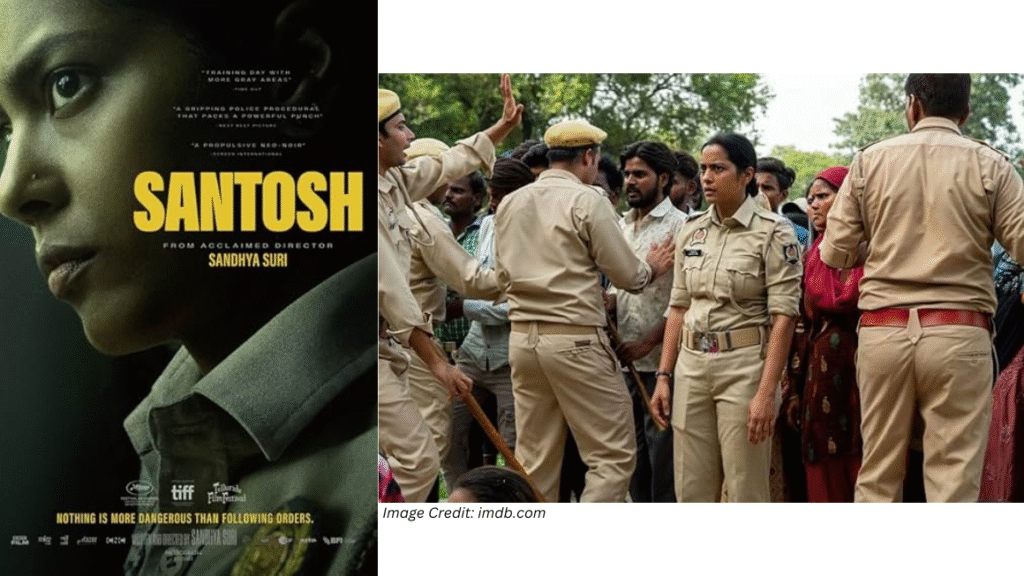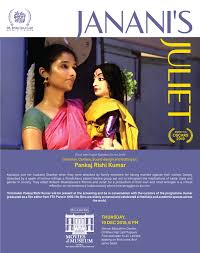How Santosh is silenced twice—in reel and real
Santosh won accolades in film festivals. But Indian audiences will not get to see it. Its creators refused to comply with the Central Board of Film Certification’s demands for edits that would cut out vital scenes. An impassioned report from Maitreyee Boruah* .

Imagine a child writing a gut-wrenching letter to her mother. This letter never gets delivered. Instead, it is torn into pieces, and the words float away like listless souls, their cries muffled and unheard. The mother remains oblivious to her child’s lament. It’s a tragedy, a hiccup, reflecting an ongoing state of silencing voices, words, art, cinema, and even jokes that might cause discomfort to the ruling Bharatiya Janata Party. Reality bites, and before it can inflict its sting, it gets banned.
This is our story. This is the story of Santosh and many others like Santosh, who could go by any name. Santosh is a common Indian name, and as illustrated in the acclaimed 2024 Hindi-language film, Santosh, it can be used for both men and women.
The film, directed by British-Indian filmmaker Sandhya Suri, has travelled the globe, earning accolades and acclaim from festivals like Cannes to the Oscars. However, when it aimed to return to its homeland and reach the audience it is based upon, it faced a setback. Santosh was banned because the creators refused to comply with the Central Board of Film Certification’s demands for edits that would cut out vital scenes.
Santosh is not the first film, nor will it be the last, to be blocked from screening. Unlike Suri, those who yield to such demands may lose the essence and heart of their work. A recent example is the film Phule, which tells the story of anti-caste social reformers Jyotirao Phule and Savitribai Phule. The attack on freedom of speech has become so common that it is hard to keep track. If it’s a film yesterday, it might be a comedian today, and tomorrow it could be a writer who hesitates to express uncomfortable truths.
Suri’s film centres around its female protagonist, a police constable and new widow who inherits her deceased husband’s job on compassionate grounds. Initially, everything seems tolerable for public consumption. However, Suri takes a bold and unimaginable step for a native filmmaker, especially in Bollywood, which has begun churning out films like The Kashmir Files and Chhaava, often filled with lies, historical distortions, and an intention to demean minority Muslims while inciting hatred against them.
Suri, as a documentarian, exposes uncomfortable realities, peeling away layers to reveal misogyny, casteism, Islamophobia, and police brutality in their raw forms, which can evoke tears. I felt that pain too, watching Santosh.
It offers a keen observation of modern India, told through the eyes of Sahana Goswami, who portrays Santosh. Her vacant expression only comes to life occasionally, expressing the struggles of being a woman trapped in a system she did not choose. Yet, Santosh remains earnest; she confronts her situation because she has no options.
In human reluctance, choices often linger in the background. However, Santosh seems to have none—she is alone on her journey. Even when she experiences a hint of companionship, it becomes clear that she is being used. Santosh is not depicted as morally upright; she is corrupt and feels a thrill for the first time when she holds a small bundle of cash offered to her. She exhibits a brutal side, showing no flinch at the blood and gore surrounding her. Nevertheless, she possesses a sense of justice, which is rare in India.
This may provide the hope we need to move forward. The film does not shy away from illustrating the hierarchy within Indian society and how individuals are utilised based on their social standing. We are all complicit in this system. The film is brilliant in its conception, writing, direction, and acting.
While Bollywood seems to struggle with producing hits, whether due to nepotism or other factors, a well-crafted film like this cannot be screened here because its themes revolve around justice and dignity. Like Santosh’s life, attaining these ideals is challenging.
*Maitreyee Boruah is a Bangalore-based independent journalist.
Related



